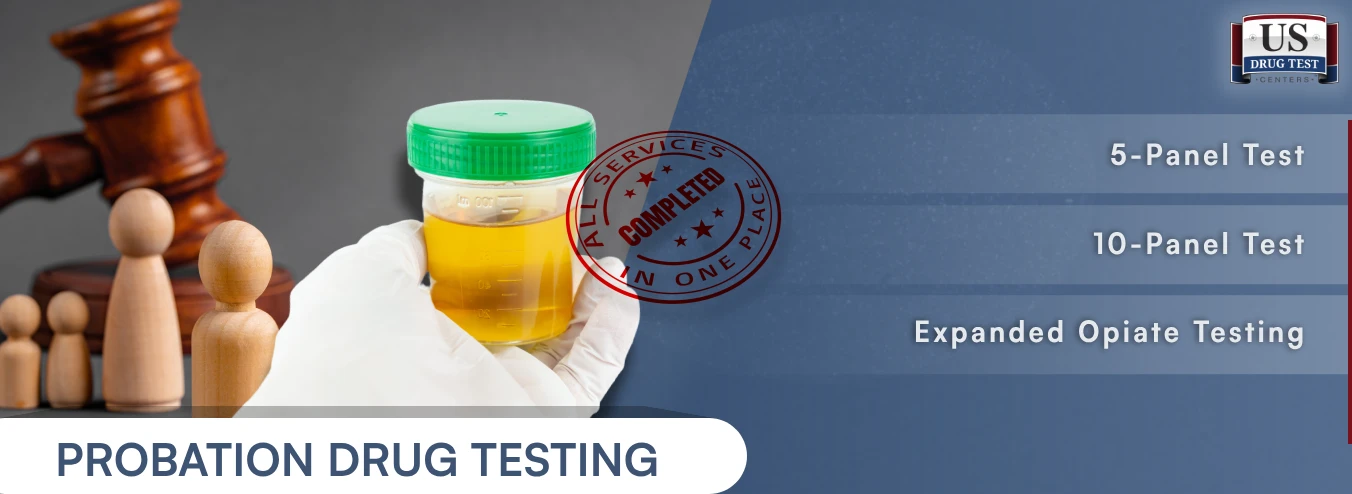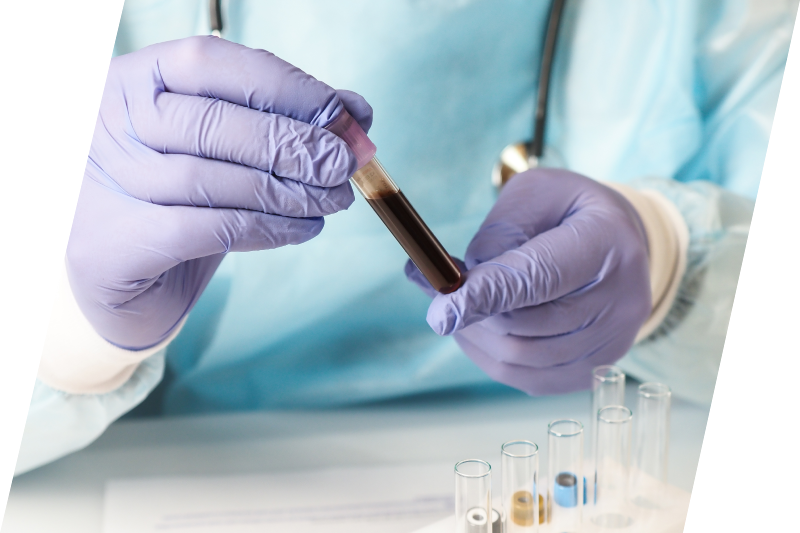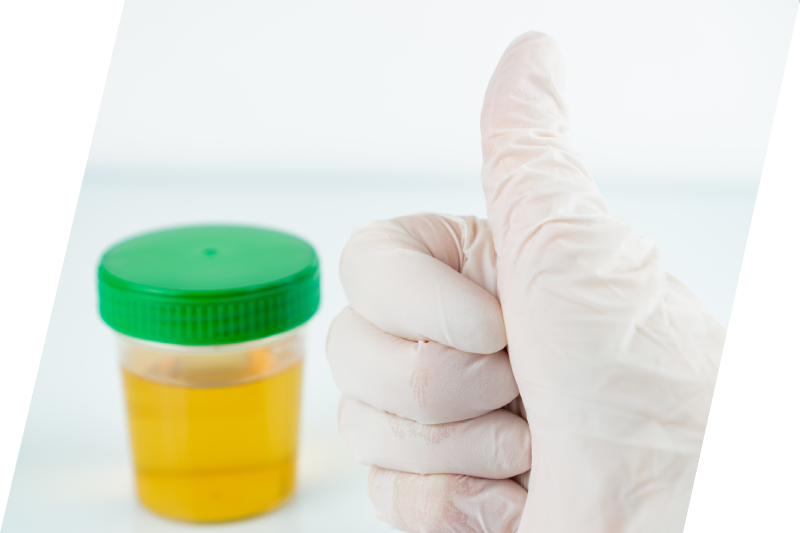
Last Updated: December 6, 2023
Have you ever asked, "Where is there probation drug testing near me?" You're in the right place.
There are different types of court-ordered drug testing. One is probation testing. There are many situations where an individual may be required to provide a probation drug or alcohol test to fulfill a legal requirement that they will remain free from illegal substance use. With probation drug testing, a court, probation officer, or parole officer may require testing as a part of a criminal sentencing agreement. Drug testing is also utilized in legal battles involving child custody, divorce cases, and DUI or DWI cases.
Probation testing programs vary across the United States. Programs often depend on your history, compliance with any requirements or terms, and trust with your probation officer.
If you're searching for "probation drug tests near me," let us help. At US Drug Test Centers, we have customer service representatives standing by to take your order for your test and have your specimen collected quickly and conveniently. We have more than 20,000 testing centers throughout the United States. Call 866-566-0261 or order your test online today!
Probation drug screening will vary depending on the regulations of each state or county. Also, court-ordered testing sometimes hinges on the severity of the offense and the user's history of misuse.
An individual's officer will help determine what test they should order. Courts most often use urine, hair, breath, or blood to screen for substance abuse.
The most frequently used probation drug tests are the:
This panel test will screen for cocaine, marijuana, phencyclidine (PCP), amphetamines, and opiates; alcohol is usually added to this panel for testing.
Learn More →This panel test will screen for cocaine, marijuana, phencyclidine (PCP), amphetamines, opiates, benzodiazepines, barbiturates, methadone, propoxyphene, and methaqualone; alcohol is usually added to this panel for testing.
Learn More →Expanded opiate testing, which can be added to the 5-panel test and the 10-panel test. Expanded opiates will test for hydrocodone, hydromorphone, oxycodone, and oxymorphone.
Learn More →Individuals who have problems with the law often have court-ordered random drug testing for probation. In many situations, a mix of both random and regular drug testing is most effective.
Imagine you get arrested for DUI, go to court, and as a result of sentencing, you get probation. The judge or probation officer orders weekly drug testing, which must be conducted at random and must be unannounced. You will need the help of a professional and experienced company to schedule these drug tests, or you might have to call in every day and check your "color status" (see below) to see if you are required to test on any given day.
Our customer service representatives are standing by to assist with scheduling unannounced random drug testing quickly and conveniently at one of our more than 20,000 locations across the United States. Call 866-566-0261 or order your test online today.
We will always send the results from your random testing to your probation officer or court officer. We can also send you a copy.
A popular method used by courts to determine when someone should be required to complete screening is through random color code systems. An individual on probation will be assigned a specific color and will be required to call the courts every single day. A recorded message will inform an individual on which color(s) must report to a collection site for a random drug and/or alcohol test. Individuals selected must report that same day immediately without exception if their color is chosen.
Exceptions for testing immediately are rarely made by the probation courts. If you are in the United States, we operate testing centers all across the country.
As an alternative, some systems leave it up to you to find a random monitoring service. US Drug Test Centers has the tools, technology, and expertise to coordinate a random testing monitoring system to meet your required drug tests.
Probation drug testing procedures are as follows:
An individual is placed on parole and ordered to submit to random testing.
A county parole officer will notify the individual (in various ways) that they must complete a test immediately.
The individual will order a test, report to the nearest drug testing collection location, and provide their specimen.
Any further course of action will depend on the drug test results received from the laboratory.

Probation drug testing may include hair testing. You need hair on your head, body, arms, or legs to be eligible for hair drug testing. Some of our facilities will require head hair, so please let our drug testing specialists know whether or not you have at least 1.5 inches of hair on your head.
US Drug Test Centers has the most comprehensive menu of hair follicle testing:
Amphetamines (methamphetamine, ecstasy, MDMA, and MDA), cocaine, opiates, PCP, and THC.
Learn More →Amphetamines, cocaine, phencyclidine (PCP), marijuana, and expanded opiates.
Learn More →Cocaine, THC, phencyclidine (PCP), benzodiazepines, barbiturates, methadone, and propoxyphene, among others.
Learn More →Cocaine, marijuana, phencyclidine (PCP), amphetamines, benzodiazepines, barbiturates, methadone, propoxyphene, tramadol, meperidine, oxycodone, and opiates (including codeine, morphine, heroin, hydrocodone, hydromorphone, and oxymorphone).
Learn More →The detection period for most drugs will vary based on many factors, such as the type of drug used, the amount consumed, the potency of the drug, an individual's body type, health conditions, metabolism, activity level, and water intake.
Urine drug testing - A urine test is the most common form of court-ordered drug testing. A urine test can show traces of drug use even after the effects of the drug have worn off. The average detection time for drug testing via urine is 1-2 days and up to 30 days from last use.
Hair follicle drug testing - Hair tests provide an extended detection window for drugs and an increased level of difficulty in adulterating a sample. Hair testing will show drug use from approximately a week and up to 90 days after the last use of an illicit substance.
Somewhere between 90% and 95% of the alcohol that a person consumes is broken down by the liver. A small amount is expelled through a person's breath and sweat. The remainder is excreted through the urine.
Alcohol will usually be present in a person's urine specimen within one hour of consumption, and alcohol typically remains detectable for up to 12 hours.
The alcohol content in urine is sometimes utilized to estimate an individual's blood-alcohol content. The amount of alcohol in a person's urine is approximately 1.33 times greater than the amount of alcohol in their bloodstream.
A common alcohol byproduct, ethyl glucuronide (EtG), can be detected in a urine specimen for up to three days after an individual's last alcoholic drink. Some laboratories will choose to screen urine specimens for ethyl sulfate (EtS), another biomarker that indicates recent alcohol use.

While EtG and EtS alcohol urine tests provide a much longer detection window for alcohol use, these screening methods may have some drawbacks.
They may not be as widely available as a standard urine screening for ethanol, and it may cost more to conduct them. EtG/EtS screening is also unable to quantify exactly how much alcohol an individual has consumed. Finally, this method of screening may also be unable to differentiate between ethanol from the consumption of alcoholic beverages versus the exposure to alcohol from other (likely legal) products, such as some mouthwashes.
In most cases, if you fail your first drug test (the "baseline"), you likely won't be penalized, assuming that the time frame of the test falls under the specific guidelines of when you were notified of your screening requirements. Your probation officer and the courts will likely require that any further tests show a decrease in drug level(s) from that original baseline test. If your next one shows a higher level or new drug, you will be penalized accordingly.
Attempting to adulterate or substitute the drug test specimen to avoid detection during random screening is a severe offense. Modern drug screening practices can identify any attempts to adulterate or otherwise cheat a test.
If you've asked, "Is there a drug test for probation near me?" the answer is yes!
However, an individual refusing or unwilling to provide a specimen for random drug screening will be liable for any legal consequences up to and including removal from their terms for failing to comply with all court-ordered drug testing requirements.
If you've asked someone, "Where is there probation UA testing near me?" we can help! US Drug Test Centers has more than 20,000 locations across the nation. Simply call 866-566-0261 or order your drug tests online.
US Drug Test Centers offers a wide variety of testing that meets the needs of both probation and court orders. Probation drug screening requirements vary depending on the state you are located in and its regulations. Whether you are required to take a breath alcohol test, urine drug test, hair drug test, or even urine or hair alcohol and ETG testing, you can rest assured that US Drug Test Centers can fulfill your needs at one of our 20,000+ collection facilities.
Yes! Random selection programs for probation and court ordered drug and alcohol testing is extremely common. You may already be familiar with a popular method referred to as a random color code system. US Drug Test Centers will enroll you in a random selection cycle program and contact you the morning that you are selected for testing. The majority of our collection facilities provide walk-in testing making the same-day testing process seamless!